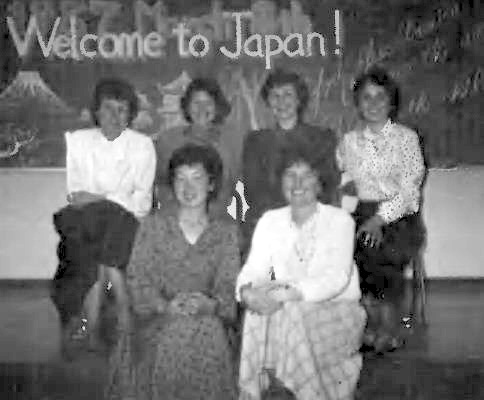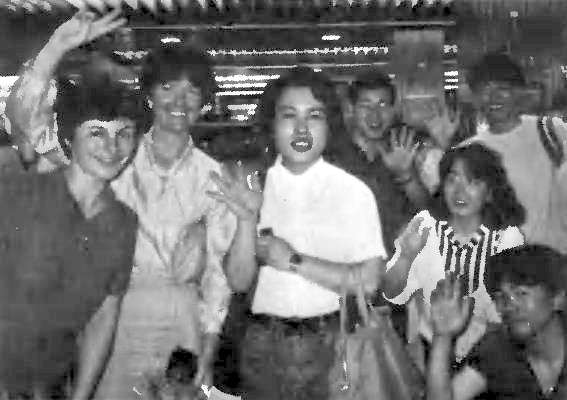![]()
The Words of the Clevenger Family
|
|
The Words of the Clevenger Family |

Welcoming
party in Osaka. Back row, left to right: Rachel Godsell, Eileen
Ohama, Kathleen Noll, and Maria Dahl. Front row, left to right: Reiko
McShane and Maria Okamoto.
It belongs to the most wonderful and memorable experiences of my life Kathleen Noll speaks for herself and five other sisters, each from a different nation, in describing their experience witnessing in Japan from February 25 to May 25, 1987. After having each spent from five -- and -- a-half to six -- and -- a -- half years on MFT in the United States, the six sisters -- Kathleen Noll, Rachel Godsell, Eileen Ohama, Maria Dahl, Maria Okamoto, and Reiko McShane -- had the opportunity to witness for 70 days in Osaka and take part in many different activities in the Japanese movement. After their return, some of them shared their impressions and experiences with.
The six sisters were split into two teams and worked at two different video centers in Osaka. The members of each team typically took surveys in the afternoons and evenings, inviting interested people to the video center, and then would spend the following morning writing or phoning the people they had met.
It was clear that the spirit world was always trying to help as much as possible. Rachel said she met a young woman who had dreamed she would meet a Western person who would help her work with international people. Rachel met her after praying to find someone who could respond to the Principle as gratefully and as quickly as she herself had.
Creating unity among themselves (the sisters originally came from the U.S.A., Germany, Australia, Spain, Canada, and Japan) and with the Japanese members was an exciting challenge, considering the cultural and language barriers. It was necessary to work closely together since the sisters needed help e, en to address envelopes or to make phone calls, and they All tried to care and follow up on each other's guests.
Their perceptions of Japan confirmed, among other things, the validity of Japan's providential role as the Eve or "mother" nation. Eileen described the culture as "full of love and sensitivity"; she said she felt as if she were "in my mother's arms:' They were awed by the Japanese members' tremendous sacrifice in providing so much manpower and material assistance to the worldwide movement while rarely getting a chance to see True Parents.
The sisters noticed that the Japanese understand the reality of the spirit world well and are very conscious of their ancestors. People often buy products because they want to "make my ancestors happy:" Because the nation is still only about three percent Christian, most Japanese have little foundation to relate to God as a loving parent, they said, but it seemed to be easy for the Japanese members to connect with love and obedience to True Parents because of the tradition of loyalty towards the Japanese emperor. The sisters said all the members were eager to hear about their own experiences with Father and Mother.
Although many Japanese members are engaged in external missions, the sisters found a high religious standard everywhere. They felt that the heart of each member was to always try to bring others closer to God and True Parents. The Japanese members showed intense concern for what was happening in the United States. The sisters were inspired by how organized and advanced the Japanese movement was and how serious the members were in trying to bring success for True Parents, America, and the providence.
The sisters generally agreed that Western members could gain a lot from the Japanese example of hard work, loyalty, graciousness, and obedience, while the Japanese could benefit from the friendly, outgoing nature of Westerners. They noted a tendency among the Japanese members to keep problems and difficulties inside and felt that more communication would probably be helpful. The Japanese heart is very deep, they said, though often too silent.
During their stay in Japan, the sisters learned the value of patience, the need to become more embracing and loving, and the need for consistency and self-motivation, regardless of external circumstances or others' lack of response. The spirit world always gave them substantial assistance, they said, if they sincerely prayed and asked for help in loving a specific person.
Several spoke about the deep experience they had at a prayer meeting during which Heung Jin Nim spoke through Peter Spoto. Heung Jin Nim told them he was very happy about their work there, and that he wished Western members could have had this experience 10 years ago. The sisters felt incredible love from him and repented deeply that they hadn't been able to do more. All six agreed that such exchanges could be of great value in the future in helping both Orientals and Westerners come to genuinely understand, value, and love each other. Said Kathleen Noll, "My hopes and prayers are that we could have contributed at least a little bit to the mutual understanding between East and West:'

Saying
goodbye at the Osaka train station. Kathleen Noll, far left.
When we first arrived in Osaka, honestly speaking, I felt nervous. "Can I really do this?" But we were so warmly welcomed that I thought, "How could I ever forget these brothers and sisters who really want to help us? How could I forget our central figures who are praying for us and supporting us?" Seventy days later, as we left Osaka, I almost cried. The brothers and sisters and our guests -- or should I say, our "spiritual children -- to -- be" -- -- brought us to the train. How much I would miss them! I was concerned, almost worried, whether our guests would keep coming to the video centers to study the Principle.
To make an internal condition for the trip, we had offered a 100 -- day 12 -- minute prayer condition for unity among ourselves as representatives of six different nations, for understanding the victory of our movement in Japan, and for successful witnessing. From my very first day in Japan, I had the natural desire to pray and study more deeply than I ever had before. I felt I needed to understand much more in order to bring the people to God. Through our central figures' guidance, I realized that the amount of time we are out on the street is not as significant as the prayerful preparation and conditions we make before we go out.
I could clearly see that I was being challenged in a different way than I had ever been challenged in my fundraising mission. I came to understand more what the foundation of faith and the foundation of substance actually mean.
Our foundation of faith from MFT was and is absolutely priceless. We sisters had a certain spiritual advantage over most of the Japanese members, who were spiritually quite young, in terms of perseverance, faith, and prayer and study habits. However, our hearts were tested many times: Guests that we hoped and prayed for got too busy in their jobs, or their parents forbade them to come back, or they could not understand or accept the Principle.
I concluded that even in these ever -- changing situations, my effort and commitment for each guest had to remain unchanging. This is exactly what has Father taught us, and it proved to be so true when, on the day we left, we received an amazing amount of heartfelt good -- bye letters from the members and our guests.
When you are in a country whose language you don't speak, there is an undeniable barrier. Yet beyond the language barriers, the bonds of heart go very deep because of our common true Parents and our common overall goal: to restore this world. I am looking forward to the day when we all speak Korean!
I did not feel strange at all to be one of a few Westerners in a homogeneous Japanese society. I like and appreciate Japanese food, but I have to admit that, since man is a creature of habit, I sometimes envisioned before me a hearty German ham sandwich or a bowl of split pea soup!
The language situation definitely made our work more difficult and challenging, but we were quite creative in trying to overcome this. The Japanese members were more than eager to improve their English (from the central figure down to the youngest member) and we got to learn a few things in Japanese, too. Besides that, we used our hands and even of feet to draw pictures to get our meaning across. Most of our guests spoke a little English, and there were two members with us who spoke fluent English, although they were not always available.
Sometimes I got a bit frustrated when I was trying to get some kind of deeper message through -- for example, the spiritual situation of a guest. But I caught myself quickly, realizing that I might be pioneering something very important, far beyond my own limited understanding
At the end of our stay in Osaka, aft we arrived back in Tokyo, I was relieved to hear from our central figure that our trip was considered victorious! One evening he took all of us to a prayer meeting, where Heung Jin Nim spoke through Peter Spoto. The effect this experience had on my spiritual life goes almost beyond words. Yet when it was happening, it seems to me absolutely normal and natural Heung Jin Nim said specifically that our Western sisters' trip to Japan ha(been very important and successful.
Prayer has definitely opened my heart and mind. I do believe that if Easterners and Westerners can understand each other better, we can love each other more. Communication is absolutely necessary to remove historical misunderstandings and resentments.
The brothers and sisters in Japan were always hopeful, persevering, and full of determination to sacrifice more than they already had. Even though they faced great difficulties, they always felt sorry that they couldn't raise more funds for project in the United States. As a representative of the American movement, I was ashamed that our members in Japan were sacrificing so much for us I determined that, from now, I want to do my best to help the American movement become more self-supporting -- by working hard, keeping this vision in my mind, and sharing with brothers and sisters whenever there is an opportunity.